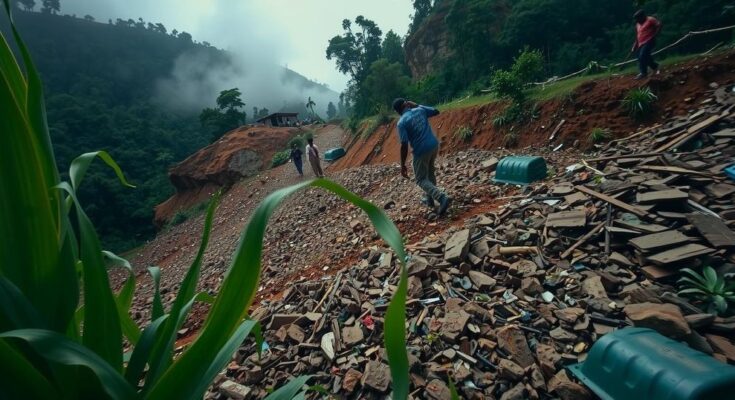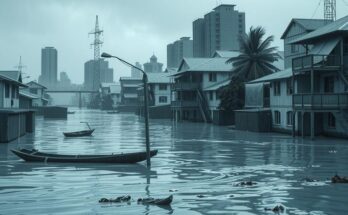At least 30 individuals are feared dead following landslides in Uganda’s Masugu village amid heavy ongoing rains. Recovery efforts have retrieved six bodies, with reports of more individuals missing. Approximately 40 homes have been destroyed, prompting national disaster alerts and emergency response deployments.
In eastern Uganda, at least 30 individuals are feared to have perished following severe landslides in the village of Masugu, according to local officials. The occurrence, which took place late on Wednesday, occurred amidst heavy rainfall that has plagued the region, prompting the government to issue a national disaster alert due to the resultant flooding and landslides. District commissioner Faheera Mpalanyi reported that recovery efforts are ongoing, with six bodies, including that of an infant, recovered so far from the debris, while the overall death toll may rise due to reports of missing persons.
The Ugandan Red Cross spokesperson, John Cliff Wamala, indicated that approximately 13 bodies have been retrieved, and he noted the extensive destruction across the region, with nearly 40 homes completely destroyed. Despite the ongoing efforts to manage the aftermath, the full extent of damage and the precise locations affected by the landslides remain unclear. Videos circulating on social media depict rescuers diligently searching for survivors in nearby Kimono village.
The Prime Minister’s office has alerted the public about the heavy rains leading to disastrous conditions across various areas in Uganda. Emergency responders have also been deployed to assist those stranded, particularly along a principal road that connects Uganda with South Sudan, which has become impassable. Tragically, a boat involved in rescue operations capsized, resulting in the loss of one engineer’s life. This incident underscores the immense challenges encountered during such catastrophic events, reminiscent of previous landslides that have claimed numerous lives in the region.
In a historical context, Africa has witnessed its deadliest landslides, including over 1,100 fatalities in Sierra Leone’s Freetown in August 2017 and another tragedy in Uganda’s Mount Elgon region that claimed more than 350 lives in February 2010.
The recent landslides in Uganda stem from heavy rainfall that has led to severe flooding in various districts. The region has a history of devastating landslides, particularly in areas such as Mount Elgon, which has experienced significant fatalities due to similar natural disasters in the past. The government and emergency services are often called upon during such events to manage rescue operations and provide assistance to affected communities. Previous instances of landslides, such as the tragic events in Sierra Leone, highlight the serious risks posed by heavy rains in vulnerable regions. The systematic preparation and response strategies of the Ugandan government, alongside local humanitarian organizations such as the Red Cross, are essential in mitigating the impact of such natural disasters and ensuring adequate support for affected populations.
In summary, the landslides in eastern Uganda have resulted in significant loss of life and damage to property amidst ongoing heavy rainfall. Although recovery efforts are in progress, the situation remains dire as many individuals are still unaccounted for. The impact of such natural disasters on local communities underscores the importance of preparedness and response frameworks to manage future incidents more effectively. The ongoing rescue operations and the alert from the Prime Minister’s office reflect a proactive approach in dealing with these calamities, though the scale of destruction necessitates comprehensive recovery efforts.
Original Source: www.barrons.com




